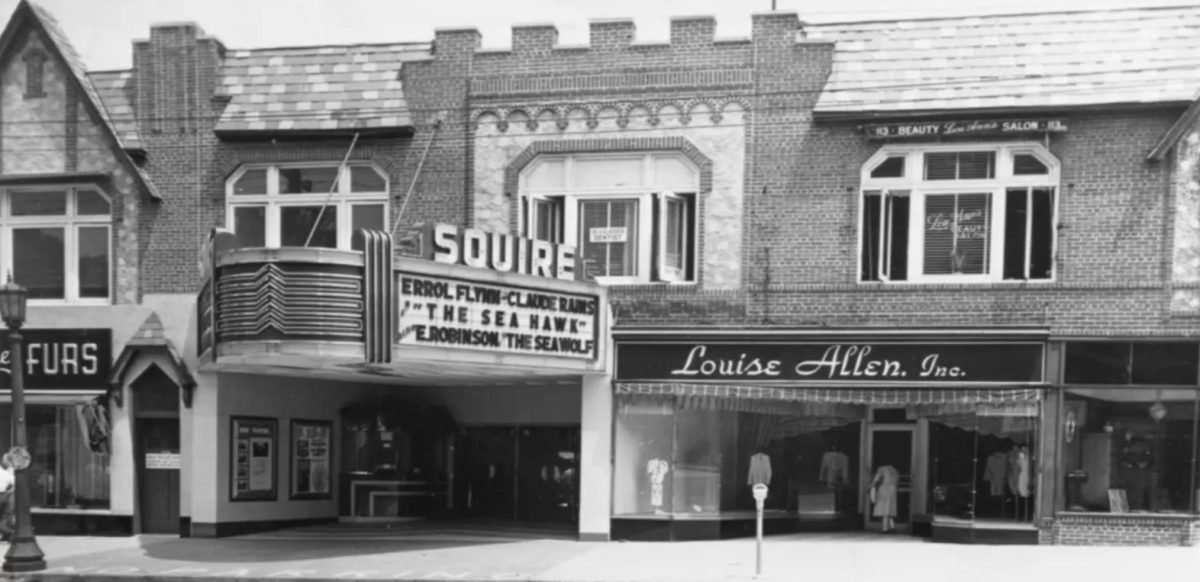Manhasset Cinemas offers a quaint welcome. After pattering along Plandome Road in a nervous-excited jitter, I finally pause upon reaching my destination. I look around. The semicircle marquee reads “ANORA” in big black letters, and the poster in the entryway confirms that the 2025 Best Picture winner is screening. Eager to escape the cold, I rush in.
Immediately, I notice the aroma. The popcorn in the back releases wisps of a smoky, buttery fragrance. From the walls floats another scent, one evoking fond memories of simpler times. The brass fixtures on the walls glow beneath the warm, muted lighting, and the faded art-deco patterns reveal secrets about this theater’s early days. Next, I notice the color. A deep, scarlet red carpet unfurls past the screening rooms and a closed-off staircase. Walking to the concession stand, I imagine myself as a star on the red carpet, camera flashing while I pose in old Hollywood style. There, I buy my small popcorn and a ticket for my matinee screening of Anora.
Finally, I take it all in. Outside the first of three screens in the theater, a pure black and white fountain decorated with stenciled images of turtles and seasides stands next to the restrooms. In the very back corner of the room, an ornate red and gold chair sits in solitude. And next to me, a small curtain lays on the floor, its long, flowing form covering up an abandoned ticket booth. In a museum, the space would read as a melodramatic and overly-pretentious mixed-media installation—but here, it all works. I walk into the theater and watch the movie.
While this movie-going experience may sound unfamilar, a similar, not as opulent local theater once stood in Great Neck as well. With its party rooms and prime location on Middle Neck Road, The Squire at Great Neck Cinemas was a neighborhood staple. That is, until it was closed in 2021 due to COVID-19 in favor of a sleek new golf-bar lounge club.
Growing up in Great Neck, I have fond memories of that theater—specifically, memories of watching Pixar’s Coco with my mom. At the time, the fourth graders in town were giving rave reviews of the movie, and I, of course, am not one to miss out on elementary school trends. With a popcorn bucket and fountain drink in hand, I walked into that theater smug, knowing that I was about to be the new cool kid in town.
Twenty minutes in, my mom pulled me out of that theater, saving the fellow moviegoers from my loud sobbing. Sorry, I can’t do skeletons. Although this story may seem insignificant, it represents a core memory that so many of my friends and I have of that very theater. Sure, maybe the seats don’t recline all the way, and the drinks aren’t as “crisp,” but local theaters are valuable in their own right. Local cinemas act as storytellers, bards, oral historians—keepers of memories in a community. And The Squire has held them since 1941.
Now that Great Neck’s cinema has closed, more and more people are flocking to larger, multiplex cinemas owned by massive corporations. And while there’s nothing wrong with going to one of these theaters—I’m not perfect either—it’s worth pausing now and then to see if that same movie is playing at a local cinema, especially when it’s an independent movie. After all, smaller theaters are more likely to screen independent films—movies that can’t be seen anywhere else—instead of solely focusing on money-making blockbusters.
Independent filmmaking has always been rooted in local cinema. Even around Long Island, local cinemas act as gathering places for community pride and independent film. Take, for example, Huntington’s Cinema Arts Center. This local theater holds a film festival every year to showcase independent and local films. In addition, the theater holds special events that coincide with the greater film community. Currently, they are screening David Lynch’s old movies in honor of his career.
And right on the aforementioned Plandome Road, Manhasset Cinemas also celebrates these local and important stories. In 2018, the theater hosted a premiere and interview panel for a local documentary about the Civil Rights Movement in North Hempstead. These stories are not only important—they are also local and pertinent to our community history.
In recent years, many local theaters have closed, not just in Great Neck but also in Roslyn, Malverne, Long Beach, and Herricks. But some still live. You can still support local theaters like Kew Gardens Cinemas, North Shore Towers Cinema, Cinemart Cinemas, and Fair Theatres. Despite hardships, local cinema on Long Island survives, just as it has for the past 100 years.
Though fewer local theaters may be open now, their impact lingers. In Manhasset Cinemas, history and memories live inside those walls, something I notice as I walk out of my screening for Anora. There, I am reminded of director Sean Baker’s message, which led me to this film in the first place. At the end of his Best Picture speech at the 97th Academy Awards, Sean Baker, in the final seconds of his allotted time, ran up to the mic to deliver his concluding message: “Long live independent cinema!” And after smelling the scents, seeing the colors, and taking in the experience of a truly local cinema, I now feel those words deeper than I ever could before. Here, storytelling meets community.
Long live local cinema!









